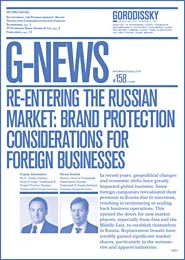Patent Enforcement and Unfair Competition in Russia
29 January 2024Reasons to Initiate an Unfair Competition Case
Investigation and Collecting Evidence
Punishment for Violation of the Competition Protection Law
Companies that are Entitled to File the Application to Open an Investigation
Facts to be Proved by the Applicant
The Effect of the Decision
Violation of patent rights constitutes patent infringement as well as an administrative offence. Moreover, under particular circumstances, it can result in criminal responsibility.
To rely on remedies provided by civil law, it is necessary to file a patent infringement lawsuit and collect sufficient proof to confirm patent infringement and the amount of compensation or damages claimed.
However, sometimes, it is reasonable to initiate an investigation by the antitrust authorities to stop a patent infringement and collect proof that can be used in further civil cases where compensation for the patent infringement can be claimed. The advantages of the unfair competition option are the subject of this paper.
According to Art. 14.5 of the Competition Protection Law, unfair competition by means of unlawful use of others’ patent rights is prohibited. This provision establishes the legal ground for any interested company to initiate an unfair competition case against a company unlawfully using others’ patent rights.
Reasons to Initiate an Unfair Competition Case
The first question is why it may be reasonable for the patent owner to file the complaint with the antitrust body. The answer is twofold:
- In the course of the investigation, the antitrust body collects documents and information that can be further used in patent infringement cases to confirm the fact of the patent infringement as well as the amount of compensation or damages claimed.
- Violation of the Competition Protection Law can result in significant negative consequences for the infringer that may deter others from infringing patent rights.
Investigation and Collecting Evidence
In a civil case, the plaintiff bears the burden of proof, which means the plaintiff’s obligation to collect and secure the proof necessary to confirm the fact of the patent infringement as well as the amount of compensation or damages claimed.
Collecting the necessary proof may be blundersome, as Russian legislation and court practice do not establish the procedure of evidence disclosure, where the defendant should disclose all documents relating to the alleged infringement. Most judges believe it is not possible to oblige the defendant to disclose evidence associated with the patent infringement due to the adversarial character of the judicial proceeding, according to which each party should prove the facts on which it grounds its case.
Other companies or governmental bodies usually submit the documents or information the plaintiff needs only after receiving the court request. However, to have the said request issued, it is necessary to file a lawsuit and convince the judge that the requested document or information is necessary to decide the case and cannot be obtained by the plaintiff alone.
Therefore, to collect all necessary proof, the plaintiff must go through complicated proceedings of motioning the court to request that other companies or governmental bodies submit the documents or information needed to confirm the patent infringement.
On the other hand, the antitrust body, being a law enforcement agency, is authorised (i) to investigate a potential violation of the competition protection law and (ii) to request companies or governmental bodies to submit documents or information that might be relevant to the investigation in question. Companies and governmental bodies must submit the requested documents and information after receiving requests issued by the Antitrust Service.
The scope of evidence necessary to investigate an unfair competition case is almost like the scope of evidence required to plead a patent infringement case in terms of the patent use and scope of the infringement (i.e., the amount of counterfeit products put on the market).
Therefore, the unfair competition option allows the patent owner to rely on the authority of the antitrust service to collect documents and information that can be used in further patent infringement cases.
Punishment for Violation of the Competition Protection Law
The second reason why the patent owner may need to initiate an unfair competition case is the negative consequences that shall be imposed for violations of the Competition Protection Law:
- According to Art. 51, in the event that a violation of the Competition Protection Law is proven, the defendant can be ordered to transfer all income received from unfair competition to the federal budget;
- According to Art. 14.33 of the Russian Code of Administrative Offenses, a fine shall be imposed on the defendant in the amount of 0,01–0,15% of the revenue received from selling the product or rendering service on the market where the violation of the Competition Protection Law was committed.
Therefore, as a result of the unfair competition investigation, the defendant may face significant negative consequences that will deter potential violators from committing patent infringement in the future.
It is worth noting that the unfair competition investigation does not preclude the patent owner from taking further actions to enforce his patent rights by relying on remedies provided by civil law. As was mentioned, the proof and information collected by the antitrust authorities in the course of their investigation can be used in a civil lawsuit to significantly help in terms of bearing the burden of proving the unlawful patent use and the amount of compensation or damages.
Companies that are Entitled to File the Application to Open an Investigation
A patent owner can initiate an unfair competition investigation. The Competition protection law does not preclude a foreign patent owner from initiating the investigation. However, in such a case, the applicant must prove it competes with the infringer in the same market.
Apart from the patent owners, any interested company may initiate an unfair competition investigation because unfair competition affects not only patent owners but also other companies that compete with the offender on the same market and suffer from its gaining unreasonable benefits out of the unlawful use of others’ patent rights. Suppose a company is not patent owner and at the same time does its business in the same market as the offender. In that case, the unfair competition option can be an effective remedy to stop unfair competition and secure its business the market in question.
It may also be reasonable to have the application signed by both the foreign patent owner and his authorised distributor in Russia.
The application needs to be filed with the antitrust body located in the region where the act of unfair competition takes place. If unfair competition takes place on the territory of a few regions or across the Russian market, the application can be filed with the Federal Antitrust Body.
Facts to be Proved by the Applicant
An action amounts to an act of unfair competition if the following facts are proven:
- The actions have been taken by a competitor. To prove this fact, the applicant shall submit documents confirming that the applicant and defendant are competitors, i.e., business companies putting similar products or rendering similar services on the same market. The applicant should also confirm that the products or services are interchangeable.
- The actions of the offender aim to gain advantages in business. An example of advantages associated with the unlawful use of patent rights in the pharmaceutical area can be related to avoiding costs associated with development, pre-clinical and clinical trials that are necessary to be made before putting the patented medicine on the market.
By using others’ patents in the infringing product, the defendant receives unjustifiable income from selling the infringing product at a comparable or lower price without any need to bear expenses associated with the development and promotion of the patented medicine. Therefore, the offender gets advantages in bad faith compared to other companies, which refrain from using others’ patent rights without the patent owners’ consent. - The actions are prohibited by law or are not in line with business habits, good faith, rationality, or justice.
The complaint should confirm that the patent can request on its own an independent expert opinion by any expert or research centre not associated with any of the involved parties.
According to the Russian Civil Code, the use of others’ patents without the patent owners’ consent is unlawful. It is the defendant who should prove that the use of the patent does not violate the law. To do so, the defendant can confirm that the consent of the patent owner was obtained or that the use of the patent falls within the exceptions established for free patent use. - The actions have caused or can cause damages to another competitor or have affected its goodwill. It is not necessary to prove that actual damages have been suffered. A risk of having damages is sufficient to meet this requirement.
The Effect of the Decision
The decision of the regional antitrust body can be appealed to the Federal Antitrust Service or the commercial court. Appealing the decision to the Federal Antitrust Service does not prevent the applicant from appealing the decision to the court.
At the same time, appealing the decision of the regional antitrust authority to the Federal Antitrust Service is an option and not obligatory, as it is up to the complainant to decide whether the decision needs to be appealed to the Federal Antitrust Service first or whether it should be appealed directly to the court, missing the stage of appealing to the Federal Antitrust Service.
The decision delivered by the Federal Antitrust Service can be appealed only to the court.
The judgment of the first instance court can be further appealed to the Court of Appeals, the Court of Cassations, and the Supreme Court.
It is worth noting that the facts established by the antitrust body and further confirmed by the commercial courts in the course of appealing the decision of the antitrust body constitute collateral estoppel and can be relied on in patent infringement lawsuits that can be further brought to enforce patent rights by the remedies provided in the Russian Civil Code.










